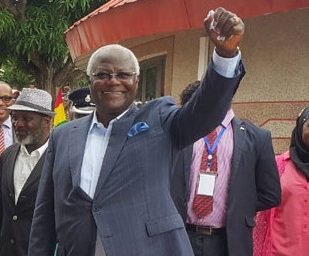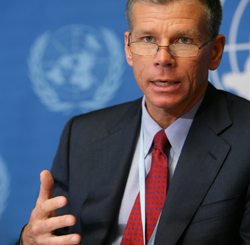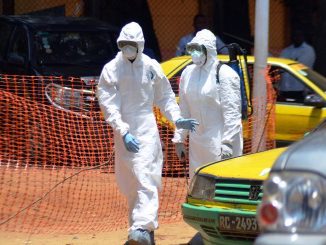
Prepared by Former President Koroma’s Media Team
ERNEST BAI KOROMA,
CHAMPION OF PEACE AND RECONCILIATION
FORMER PRESIDENT OF THE REPUBLIC OF SIERRA LEONE (2007-2018)
TEN YEARS OF RECONSTRUCTION, PEACE CONSOLIDATION, DEVELOPMENT AND GOOD GOVERNANCE
In September 2007, the people of Sierra Leone elected Ernest Bai Koroma as the 4th President of Sierra Leone. Immediately upon taking office President Koroma took action to begin the process of rebuilding a country devastated by ten years of war which had ended in 2002.
After serving five years in parliament, Ernest Bai Koroma was ready to create long lasting impactful change for the development of Sierra Leone. President Koroma was well aware of the challenges that existed in the country that he had pledged to serve but he was up for the challenge and began with strong unifying leadership to rebuild the country to improve economic stability, fight corruption, implement reform and establish good governance practices, all to improve the quality of life for his fellow citizens.
Most of the country had not seen electricity and pipe borne water for three decades. Roads were in such a state of disrepair that some parts of the country were nearly inaccessible. A few hours’ journeys could take several days. Total electricity generation was less than 10 megawatts for the whole country.
.,. “Within weeks of being elected, we prioritized our goals within the framework of the Agenda for Change,” says former President Koroma. “We identified the sectors that would trigger economic growth: infrastructure, energy, agriculture, social services and a strong private sector.”
We sought support from the international community, and we were quick to establish targets. This generated confidence and support, which contributed to the turnaround that we experienced.” One of the key processes was to engage in the implementation of the United Nations Sustainable Development Goals as a policy commitment in taking action to overcome challenges and a continuing action to sustain, deepen and expand achievements.
An early initiative for the Koroma administration was the reform of Sierra Leone’s institutions, targeting endemic corruption as a major hindrance to national development. Through the reformation of the Anti- Corruption Commission (ACC), Sierra Leone committed itself to stopping one of the key barriers to economic progress.
“As soon as we came into government, our first major action was to reform the anti-corruption legislation, giving more autonomy to the Anti-Corruption Commission (ACC),” says President Koroma. “It now has the power not only to investigate but to prosecute as well: we have created an institution to fight corruption and strengthen transparency.”
Between 2010 and 2012, as a result of the steps taken by the country to address corruption, Sierra Leone was reviewed by Thailand and Benin. The United Nations Commission against Corruption (UNCAC) undertook tremendous strides to ensure compliance to the provisions of the statute by facilitating two country reviews on the implementation of selected chapters of the UNCAC 1 In 2014 as part of the Government’s National Action Plan the pay no bribe campaign zero tolerance against corruption was launched. One of the critical results of this campaign was a 53% reduction in bribe paying nationwide.
The Koroma reforms allowed the country’s independent anti-corruption agents to
1 https://www.unodc.org/unodc/en/treaties/CAC/
2 https://www.opengovpartnership.org/…/SIERRA%20LEONE_FINAL%2…CTION%20PLAN_6_15_2014_Final.pdf
be one of the most efficient prosecutorial groups in Africa, with the Anti-Corruption Commission (ACC) acting as a politically blind institution, prosecuting and convicting members of all political parties. This non-partisan approach based on the no divide no rule principle enhanced the transparency of the process in place and safeguarded the human rights of all citizens. Sierra Leone was recognized as the third most improved country in the region in terms of safety and rule of law, participation and Human Rights as per the Ibrahim index of African Governance.
To support the Agenda for Change and spur the needed economic growth for Sierra Leone, the Koroma administration launched its Agenda for Prosperity focused on economic diversification; championing the natural resources; promoting international competitiveness and supporting human development. Because of these initiatives, Sierra Leone was recognized as one of the fastest-growing economies in the world; a growth which climaxed at 20 percent in 2013. In recognition of its unprecedented economic growth, in 2014 the World Bank recognized Sierra Leone and former President Koroma’s achievements, “Since the end of the brutal civil war in 2002, Sierra Leone has made tremendous progress towards political stability and economic growth. The country has been on a path of reconciliation, reconstruction, and stabilization.”
“Sierra Leone has taught the world many lessons, but none more important than the power of people to shape the future,” said Ban Ki-moon at the closing ceremony in Freetown on 5 March, 2014.
During the administration’s time of economic growth and change, the country was devastated by the Ebola epidemic in West Africa in early 2014. Sierra Leone was the hardest hit country but overcame the deadly disease through President Koroma’s steady leadership and by cooperation with neighboring nations and international aid organizations to fight the disease. The World Health Organization declared Sierra Leone was Ebola-free in March 2016.
Koroma states, “We had a projected growth of 13.2 percent before the epidemic broke out, and we were considered one of the most transformed countries in terms of governance. We have conducted free and fair elections, we have strengthened our institutions, we are fighting against corruption, we are a religiously-tolerant country, and we have been reported to be the most peaceful country in West Africa.”
He has upheld the rule of law; the tenet of democracy and fundamental human rights showing continuous commitment to the NO DIVIDE AND RULE policies and has spoken openly about what it represents for Peace and Security in Africa. Former President Ernest Bai Koroma was one of those engaged in the peace mediation process in the Mano River Union which involved Sierra Leone, Guinea, Liberia and the Ivory Coast.
He was amongst the Presidential team in The Gambia that negotiated the peaceful exit and transfer of power of Former President Yaya Jammeh to President Adama Barrow. Notwithstanding these, one of Former President Ernest Bai Koroma credential as an African Statesman was his role as Chairman of the Committee of Ten Heads of States which was mandated by the African Union to articulate the common African position on the reform of the United Nations Security Council which will pave the way for an African representation into this important body.
3 http://s.mo.ibrahim.foundation/…/2116…/2017-IIAG-Report.pdf…502629705.1517602704
4 http://www.worldbank.org/…/sierra-leone-path-reconciliation…
5 https://www.un.org/…/secretary-generals-remarks-closing-cer…
Understanding the difficulties and implications of leading a nation through ten years of transformational peace consolidation and ensuring a peaceful transition of power, the Former President of Sierra Leone, Ernest Bai Koroma wants to share his experience on peace building and provide input to further the work of peace and security in Africa.
Sierra Leone represents one of the world’s most successful cases of post conflict recovery, peacekeeping and peacebuilding. March 5, 2014 UN Secretary General, Ban Ki-moon
The solid foundation built during Koroma’s ten years in office was that of broad reaching policy reforms that stabilized and strengthened Sierra Leone’s economy, harnessed positive global relationships and established good governance practices that fought corruption at all levels. Through these reformative years, it is evident that with former President Ernest Bai Koroma’s leadership and transformative initiatives he has positioned the nation of Sierra Leone to continue its path of peace and stability and assume a greater presence on the global stage.
“While there remains much to do in Sierra Leone, the building blocks are in place for the country to move into the next decade from a position of economic strength and social equality.” – World Folio, 2018
KEY ACCOMPLISHMENTS:
– Former President Koroma is a respected African Leader because he not only transitioned his country of Sierra Leone from a fragile post-war state to the most peaceful country in West Africa.
– While celebrating the successful conclusion of the United Nations Integrated Peacebuilding Office, the Secretary-General said that this was a triumph for the people of Sierra Leone and that the United Nations was proud to have supported them. “Sierra Leone has taught the world many lessons, but none more important than the power of people to shape the future,” said UN Secretary General Ban Ki-moon at the closing ceremony in Freetown on 5 March, 2014 6 7
– Head of Mission for the United Nations Peace Building Commission 2015 Dr. Macharia Kamau stated that Sierra Leone’s progress in promoting peace and democracy has not gone unnoticed. “We come away feeling that this country is on the right path: this country is not where it was ten years ago. Something fundamentally different has happened: this country has experienced great transformation, under the leadership of President Koroma, the people have found their voice and developed self-belief which is something that comes only with strong leadership”
– By the time he left office, Sierra Leone was reckoned to be the most peaceful country in West Africa and the 4th most peaceful in Africa. His commitment to peace led him to champion several peace initiatives across the African continent from the Ivory Coast, Guinea- Bissau to The Gambia. He has been described by his peers at the African Union (AU) under the African Peer Review Mechanism (APRM) as a strong and dynamic visionary democratic leader in Africa
– Former President Koroma’s leadership had an impeccable human rights record, no political prisoners and no journalist or civil society activist incarcerated. The freedom of the press was part of his fight for democracy. A
6 https://www.un.org/…/secretary-generals-remarks-closing-cer…
7 https://unipsil.unmissions.org/sierra-leone-saw-many-un-%E2…completes-its-mandate
vibrant media and civil society emerged owing to the free space provided for the citizenry to exercise their freedoms of expression as well as association.
-A multi-party system existed with an independent electoral process to conduct free, fair and credible local, parliamentary and presidential elections across the country leading to a peaceful transition of power to the opposing party in 2018.
-The establishment of magistrates’ courts in all districts and the establishment of the Legal Aid Board, allowed citizens to enjoy free access to justice whether in the exercise of their civil/political rights or commercial/investment rights. This built citizens’ confidence in in the justice sector. The Legal Aid Board guarantees legal representation for indigent persons residing in Sierra Leone.
– Positive track record for Good Governance, with peer recognition from the former President of the United States Barack Obama and British Prime Minister Tony Blair as well as many internationally accredited organizations.
– Strengthened the Anti-Corruption Act (ACC) by amending it to give prosecutorial powers, implemented and enforced the Anti-corruption Act making it one of the most robust Anti-corruption Act in Africa. During former President Koroma’s tenure several senior government officials and ministers were prosecuted. He reshuffled his cabinet three times making it clear that corruption was not an option under his government.
-Under his administration the first Office for the First Lady of Sierra Leone was established. Moreover, in terms of policy and legislation we must include the appointment of the first female Brigadier General, the first female director general of the Sierra Leone Road Safety Authority, the first Executive Secretary of the Environmental Protection Agency, Appointment of female Chief Justice, appointment of first female Commissioner of the National Revenue Authority, first female Registrar General and first female Solicitor General among other affirmative actions.
– Focused on women’s empowerment issues and supported women in leadership positions. His administration enacted in 2007 the three Gender Acts—the Domestic Violence Act, the Devolution of Estates Act and the Registration of Customary Marriage and Divorce Act—which provide protection to women under all three types of law.
– Implemented reforms to improve the country’s investment environment and remove obstacles blocking the private sector development making Sierra Leone one of the fastest growing economies until the tragic Ebola Epidemic.
– Established the corporate commission, to the reform for the registration of businesses, improvement has been made in Sierra Leone to facilitate the business environment.
– The World Bank reported on several of the Koroma Reforms according to the “World Bank’s Doing Business Project”.
– Koroma’s leadership while in office has been recognized by the IMF, World Bank, MO Ibrahim Index, and United Nations.
– Established a Private Public Partnership unit under the direct supervision of the Office of the President.
8 http://www.worldbank.org/en/search?q=Koroma+reform
KEY ACCOMPLISHMENTS:
Infrastructure – Between 2008-2018, President Koroma implemented Sierra Leone’s biggest infrastructure development in the country’s history; building roads in virtually every district and highways linking villages and markets, towns to the capital and to neighboring countries. (3,500km) Over 12 major bridges were (re)constructed/rehabilitated across the country.
Energy – Restored electricity to the capital of Freetown and for the first time in over three decades to 9 district headquarters and several communities. Electricity generation increased from about 10 megawatts in 2007 to about 280 megawatts in 2018
Pipe Borne Water 2007 2012 2016 With the Three Towns Water project coming on stream by 2018, this figure would exceed 54%
Access to Water
Rural Water Coverage 26% 34% 47%
Health and Sanitation as a human right – As a direct response to the dismal indicators of maternal and child mortality, the President introduced the Free Health Care Initiative prioritizing the provision of basic essential health services to pregnant and lactating women and children under five years. Launched an extensive program of health facility rehabilitation and construction. Nine tertiary hospitals were upgraded to national medical centres of excellence and over 57 other health facilities either constructed or rehabilitated. Postgraduate medical training to train specialists in country. Teaching hospitals have therefore been established to facilitate such postgraduate training. Initiated the National Emergency Medical Services (NEMS) Project.
Education – while the first university in Sierra Leone was established in 1827 and the second in 1965, under President Koroma’s leadership, three universities were established in 10 years. At the same time subsidized tuition fees for University students were offered. University education was free for females studying sciences.
Youth Empowerment – Reviewed of the National Youth Commission Act 2009, Revised National Youth Policy 2014 which stipulates priority areas for youth development including: Education and skills training, Science and Technology, Agriculture, and Health. A National Youth Programs was developed as Blue Print for
Youth Development. The National Youth Service Scheme was introduced to give young graduates job experiences and skills required for employment. Youth Village institutions were enabled to provide training in agriculture, entrepreneurship and vocational and technical skills.
International Cooperation –. Under President Koroma, Sierra Leone chaired the AU Committee of 10 for the Reform of the United Nations, chaired the African Union Peace and Security Council for two consecutive terms, (re)established several diplomatic embassies, consulates and missions thereby expanding the country’s presence and voice around the world.



